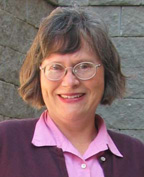UNMC College of Nursing faculty members are celebrating the strides they’ve made over the years.
Gov. Dave Heineman has proclaimed Feb. 20 to 27 as Nurse Practitioner Week in Nebraska. The proclamation was timed for the Nebraska Nurse Practitioners 14th annual conference today through Saturday in Kearney, where a number of UNMC health professionals will speak.
UNMC College of Nursing faculty members have contributed to the increase in nurse practitioners in the state. In 1992, the college started Nebraska’s first master’s degree for nurse practitioner specialties.
 |
Polly Hulme, Ph.D. |
“Nurse practitioners provide safe, cost-effective, high quality care to health care consumers,” said Polly Hulme, Ph.D., associate professor, family nurse practitioner program, UNMC College of Nursing. In addition to teaching and doing research, Dr. Hulme sees patients one day a week at the UNMC College of Nursing Family Health Care Center in the South Omaha Neighborhood Association building at 31st and Q Streets.
Nurse practitioners perform a variety of services for patients of all ages, including diagnosing and treating acute and chronic illnesses, performing physical examinations, and counseling and teaching individuals, families, and groups about health-related problems. They work in diverse health care settings, including hospitals, long-term care facilities and office practices.
Most nurse practitioners are registered nurses with master’s or doctoral degrees in nursing. The UNMC nurse practitioner program requires 600 hours of clinical practice. Specialties offered include family, women’s health, pediatric, neonatal, adult, geriatric and psychiatric/mental health nurse practitioner.
Average salaries for nurse practitioners range between $55,000 and $80,000. Research has shown that 80 percent of the reasons most persons seek medical attention can be managed effectively by nurse practitioners.
“Many nurse practitioners will tell you the difference in what they do is their philosophy. I’m a nurse first. We are trained to look at the whole person. We also emphasize education, health promotion and disease prevention,” Dr. Hulme said.
Dr. Hulme said what she likes about being a nurse practitioner is practicing her nursing skills, the challenge, variety and most of all, her patients.
“We work collegially with other health professionals and refer patients as needed. Our patients get optimal care. We teach students early on how to recognize if things are out of the scope of our practice,” Dr. Hulme said.
She said nurse practitioners have become increasing valuable, especially in rural areas where there are health professions shortage areas. “Many of our graduates come from and return to practice in rural areas,” Dr. Hulme said.
Nurse practitioners are important in addressing the shortage of health care providers across Nebraska.
A family nurse practitioner at the Plum Creek Medical Group in Lexington, Barb Foss, said people are more familiar with nurse practitioners.
“The public better understands what a nurse practitioner is,” said Foss, a 1999 graduate of the College of Nursing family nurse practitioner program and president of the Nebraska Nurse Practitioners. “More people have been seen by nurse practitioners, especially in the rural areas. They tend to know more about our capabilities and use nurse practitioners more as health care providers.”
If you ask people why they see nurse practitioners, you’ll get a lot of different answers. But there seems to be a common theme: caring.
Sharon Kdogenski has seen nurse practitioners for more than 10 years. She began going to the Family Health Care Center after being laid off from her job in 1994. When her medical insurance ran out, she sought the center’s services through Medicaid.
“The center was the only one I could get in with,” Kdogenski said. “I hated to do it, but thank God it’s there.” Now retired on disability, Kdogenski continues to see nurse practitioners. She talked about the care she receives primarily through Cathy Binstock.
“She is such a caring and great person. I can ask her everything and anything. She’s so helpful and so patient. We get along great. I can explain my health problems to her with comfort. Out of a 10, she’s an 11,” Kdogenski said.
“Another thing I appreciate so much is she (Cathy) follows up with phone calls to see how I’m doing and if I’m having problems with my medication. It’s very important.”